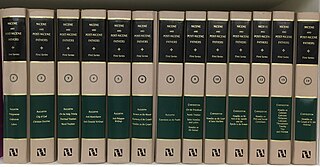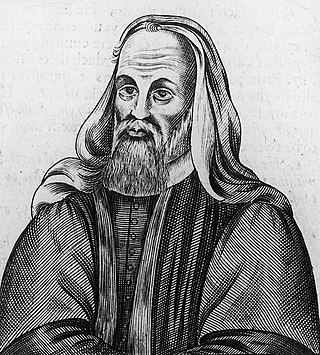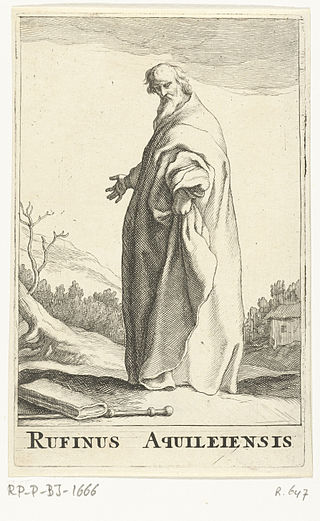
Jerome, also known as Jerome of Stridon, was an early Christian priest, confessor, theologian, translator, and historian; he is commonly known as Saint Jerome.

Pope Innocent I was the bishop of Rome from 401 to his death on 12 March 417. From the beginning of his papacy, he was seen as the general arbitrator of ecclesiastical disputes in both the East and the West. He confirmed the prerogatives of the Archbishop of Thessalonica, and issued a decretal on disciplinary matters referred to him by the Bishop of Rouen. He defended the exiled John Chrysostom and consulted with the bishops of Africa concerning the Pelagian controversy, confirming the decisions of the African synods. The Catholic priest-scholar Johann Peter Kirsch, 1500 years later, described Innocent as a very energetic and highly gifted individual "...who fulfilled admirably the duties of his office".
Pelagianism is a Christian theological position that holds that the original sin did not taint human nature and that humans by divine grace have free will to achieve human perfection. Pelagius, an ascetic and philosopher from the British Isles, taught that God could not command believers to do the impossible, and therefore it must be possible to satisfy all divine commandments. He also taught that it was unjust to punish one person for the sins of another; therefore, infants are born blameless. Pelagius accepted no excuse for sinful behaviour and taught that all Christians, regardless of their station in life, should live unimpeachable, sinless lives.

The Vulgate, sometimes referred to as the Latin Vulgate, is a late-4th-century Latin translation of the Bible.

A Select Library of the Nicene and Post-Nicene Fathers of the Christian Church, usually known as the Nicene and Post-Nicene Fathers (NPNF), is a set of books containing translations of early Christian writings into English. It was published between 1886 and 1900.

Pelagius was a Romano-British theologian known for promoting a system of doctrines which emphasized human choice in salvation and denied original sin. Pelagius was accused of heresy at the synod of Jerusalem in 415 and his doctrines were harshly criticized by Augustine of Hippo, especially the Pelagian views about mankind's good nature and individual responsibility for choosing asceticism. Pelagius especially stressed the freedom of human will. Very little is known about the personal life and career of Pelagius.

The Peshitta is the standard version of the Bible for churches in the Syriac tradition, including the Maronite Church, the Chaldean Catholic Church, the Syriac Catholic Church, the Syriac Orthodox Church, the Malankara Orthodox Syrian Church, the Malabar Independent Syrian Church, the Syro-Malankara Catholic Church, the Assyrian Church of the East and the Syro-Malabar Church.
Salamanes Hermias Sozomenos, also known as Sozomen, was a Roman lawyer and historian of the Christian Church.
Gennadius of Massilia, also known as Gennadius Scholasticus or Gennadius Massiliensis, was a 5th-century Christian priest and historian.

Tyrannius Rufinus, also called Rufinus of Aquileia, was a monk, philosopher, historian, and theologian who worked to translate Greek patristic material, especially the work of Origen, into Latin.
Gaius Marius Victorinus was a Roman grammarian, rhetorician and Neoplatonic philosopher. Victorinus was African by birth and experienced the height of his career during the reign of Constantius II. He is also known for translating two of Aristotle's books from ancient Greek into Latin: the Categories and On Interpretation. Victorinus had a religious conversion, from being a pagan to a Christian, "at an advanced old age".

Joseph and Aseneth is a narrative that dates from between 200 BCE and 200 CE. It concerns the Hebrew patriarch Joseph and his marriage to Asenath, expanding the fleeting mentions of their relationship in the Book of Genesis. The text was translated widely, including into Amharic, Arabic, Armenian, Early Modern German, Latin, Middle English, Old French, Romanian, Serbian and Syriac.
Nemesius of Emesa was a Christian philosopher, and the author of a treatise Περὶ φύσεως ἀνθρώπου or De natura hominis. According to the title of his book, he was the Bishop of Emesa. His book is an attempt to compile a system of anthropology from the standpoint of Christian philosophy; it was very influential in later Greek, Arabic and Christian thought.
The Old Roman Symbol, or Old Roman Creed, is an earlier and shorter version of the Apostles’ Creed. It was based on the 2nd-century Rule of Faith and the interrogatory declaration of faith for those receiving Baptism, which by the 4th century was everywhere tripartite in structure, following Matthew 28:19, which is part of the Great Commission.
Thomas the Presbyter was a Syriac Orthodox priest from the vicinity of Reshaina in Upper Mesopotamia who wrote the Syriac Chronicle of 640, which is also known by many other names.

Jean Garnier was a French Jesuit church historian, patristic scholar, and moral theologian.
Marius Mercator was a Latin Christian ecclesiastical writer best known for his advocacy of Augustinian theology during the Pelagian controversy.
De recta in Deum fide, also known as the Dialogue of Adamantius, is an anonymous Christian dialogue in Greek from the late 3rd or early 4th century. It was probably written in Asia Minor or Syria. It is a defence of Christian orthodoxy against the heresies of Marcionism and Gnosticism.

The Monarchian Prologues are a set of Latin introductions to the four canonical gospels of Matthew, Mark, Luke and John. They were long thought to have been written in the second or third century from a Monarchian perspective, hence their name. Today they are generally regarded as Priscillianist compositions from the late fourth or early fifth century. They appear to be the work of a single author. John Chapman even concluded that they were the work of Priscillian himself, who died in 386.

The Augustine of Hippo bibliography contains a list of works published by fourth-century Christian bishop and theologian Augustine of Hippo.
!["Rufinus [formerly?] of the Syrian nation" as it appears in the only extant copy of Mercator's works, the Collection Palatina. Caroline minuscule, 9th-century, probably Lorsch. Rufinus quondam natione syrus.PNG](http://upload.wikimedia.org/wikipedia/en/thumb/c/c0/Rufinus_quondam_natione_syrus.PNG/300px-Rufinus_quondam_natione_syrus.PNG)










